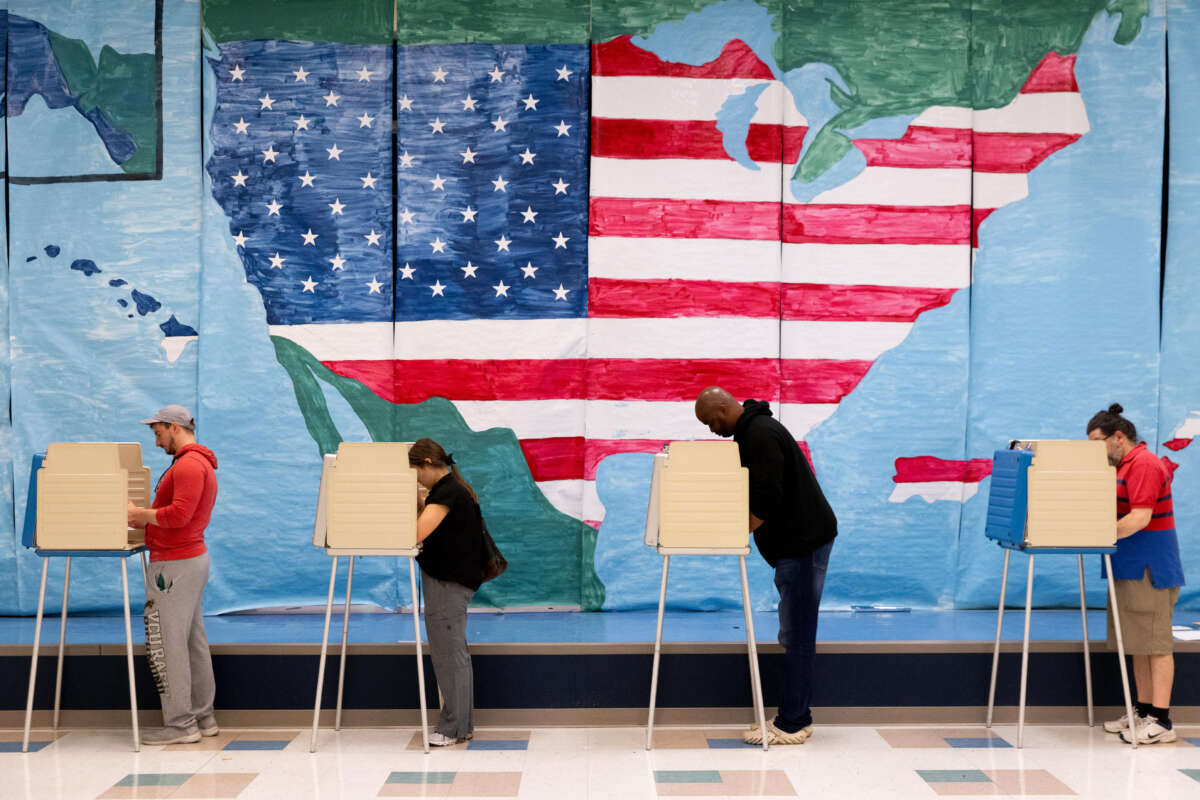Part of the Series
Voting Wrongs
Did you know that Truthout is a nonprofit and independently funded by readers like you? If you value what we do, please support our work with a donation.
On Monday, a conservative three-judge panel on the United State’s most right-wing federal court struck down the primary enforcement mechanism of the Voting Rights Act in a ruling that experts are saying would be “catastrophic” for voting rights across the country if upheld.
In a 2-1 ruling, the 8th Circuit Court of Appeals ruled that private litigants, like voting and civil rights groups, are not allowed to bring lawsuits challenging discriminatory practices in redistricting and election administration under Section 2 of the law. “Private right of action,” as it’s known, is the main way that the Voting Rights Act is enforced; for decades, civil rights groups have filed lawsuits under the Voting Rights Act to challenge gerrymandering and racist voter suppression efforts, particularly in the South. The ruling, then, would leave only the Justice Department to bring lawsuits when electoral maps or changes to election administration rules have discriminatory effects on voters.
Experts say the ruling will gut the Voting Rights Act, the landmark 1965 law aimed at preventing racial discrimination in elections that Congress passed in a response to the civil rights movement’s widespread protests. As voting rights group Democracy Docket pointed out on Monday, only 15 of the 182 successful Section 2 lawsuits of the last 40 years were brought solely by the Department of Justice.
“It’s hard to overstate how important and detrimental this decision would be if allowed to stand: the vast majority of claims to enforce section 2 of the Voting Rights Act are brought by private plaintiffs, not the Department of Justice with limited resources,” wrote University of California, Los Angeles law professor and director of the Safeguarding Democracy Project Rick Hasen in Election Law Blog. “If minority voters are going to continue to elect representatives of their choice, they are going to need private attorneys to bring those suits.”
The ruling was written by David Stras, a nominee of former President Donald Trump who argues based on text of the law that only the U.S. attorney general has the authority to enforce the Voting Rights Act, despite decades of precedents set by lower courts and the Supreme Court finding that Congress intended for private citizens to have the ability to sue under the law, experts say. The case, Arkansas State Conference NAACP v. Arkansas Board of Apportionment, is likely to be heard by the full 8th Circuit Court of Appeals and eventually reach the Supreme Court.
It’s unclear how the Supreme Court would rule; the Voting Rights Act, now a particular target of conservatives as Republicans continue their quest to erode voting rights across the country, very narrowly dodged being weakened in a 5-4 ruling by the Supreme Court earlier this year in a case over Alabama’s unconstitutional and racist voting maps.
Voting rights advocates have condemned the decision, saying that it puts the voting rights of millions at risk, especially those of Black Americans who have long struggled for equal access to the ballot.
Sophia Lin Lakin, who argued the case as director of the American Civil Liberties Union’s Voting Rights Project, said the ruling is a “travesty for democracy.”
“For generations, private individuals have brought cases under Section 2 of the Voting Rights Act to protect their right to vote,” Lakin said in a statement on Monday. “No court had denied them the ability to bring their claims in federal court — with the sole exception of the district court, and now the Eighth Circuit. By failing to reverse the district court’s radical decision, the Eighth Circuit has put the Voting Rights Act in jeopardy, tossing aside critical protections that voters fought and died for.”
A terrifying moment. We appeal for your support.
In the last weeks, we have witnessed an authoritarian assault on communities in Minnesota and across the nation.
The need for truthful, grassroots reporting is urgent at this cataclysmic historical moment. Yet, Trump-aligned billionaires and other allies have taken over many legacy media outlets — the culmination of a decades-long campaign to place control of the narrative into the hands of the political right.
We refuse to let Trump’s blatant propaganda machine go unchecked. Untethered to corporate ownership or advertisers, Truthout remains fearless in our reporting and our determination to use journalism as a tool for justice.
But we need your help just to fund our basic expenses. Over 80 percent of Truthout’s funding comes from small individual donations from our community of readers, and over a third of our total budget is supported by recurring monthly donors.
Truthout has launched a fundraiser to add 310 new monthly donors in the next 4 days. Whether you can make a small monthly donation or a larger one-time gift, Truthout only works with your support.
